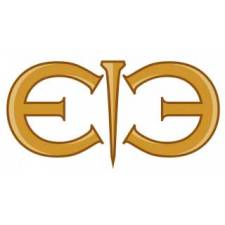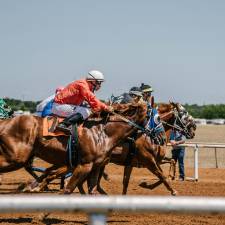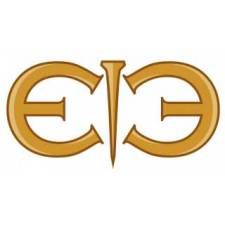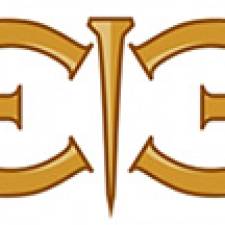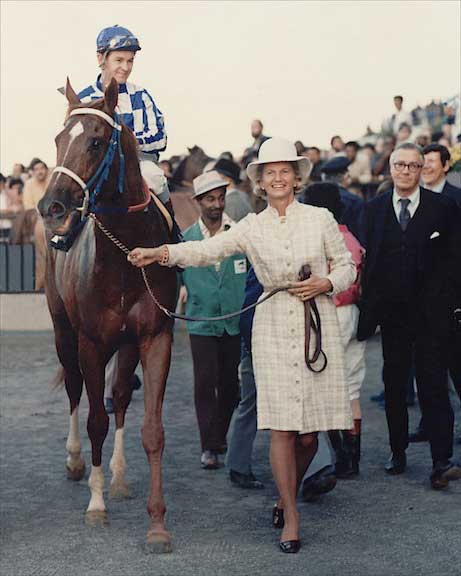
By Marion E. Altieri for Equine Info Exchange
“Screw the men. I’ve got the horse.”
The entire horse racing community is mourning the loss of Helen B. (Penny) Chenery, the driven horsewoman who died on September 16, 2017. Part of the healthy grief process is to talk it out, via the sharing of stories about the beloved, recently-departed. The tales help us make sense of the death, and assure us that—even if only in legend and lore—the one we love lives on.
I am one such person, who needs to tell my story. I’m sharing it because it’s true—because I love Penny--and, that actually through a bizarre twist of fortune—I got to know her in a way that very few others have. I was singled out not because of any great thing I did, but because I was in the right church, at the right time.
If social media is any indication, it appears that half the world population has a Penny Narrative: of meeting her, knowing her—and the usual, Sharing a Sherry/night before a Belmont Stakes anecdote. Many people (most notably, women and grrrlz) met her over the years, and came away from the experience inspired to pursue their racing careers. Indeed, many have been thusly blessed.
Penny meant so much to me personally, for reasons that are multi-layered: she was more than a brilliant businesswoman who showed the way. More than a famous person who taught by example—that it’s OK to be strong, smart; funny, irreverent; well-heeled and wildly earthy—all at the same time.
Penny was my Mentor.
We met in 2003, in a way that I could not have invented, in my wildest writerly imagination. The very-real setting for the story sounds like the plot of a classic film—but one that audiences would assume, had to be fiction.* I believe that I was allowed to see her quite fully in large part because of our unusual introduction, through a church in Pelham, New York.
And, because we were of similar mind regarding horse welfare and the roles of women in horse racing--she chose to give me the leg up onto my steed, mentoring me at the very beginning of my vocation as a horse racing media professional.
Penny was both the horse and the trainer.
I saw her for all of who she was (is), I believe: no blinkers on here. I’ve never been a fan of lying to myself, of seeing only the parts of a human as my myth requires. I believe that I saw Penny as fully as any person who’s not her actual children could know her, for I was blessed that she felt comfortable enough around me to be herself.
And herself was a magnificent tower of strength, humor and fortitude. And with a single wink and a nudge, she let me into her secret society—she showed me layers of her spirit that she didn’t necessarily show to everyone. Yes, her children, business partners and closest friends knew The Whole Penny, and I’m convinced that I was allowed to peek under that veil, as well.
Early in September 2004, Penny Chenery had a heart attack. She was 82, and of course had led a very active life up to that point—so something like a heart attack was probably not unexpected. The part of the story that did surprise many people was that, at age 82—the impatient patient drove herself to Central Baptist Hospital near her Lexington, Kentucky home.
Well, of course she did. That information didn't seem odd to me, at all. By late 2004, I’d known the icon for over a year, and knew (as did all her family, friends and colleagues)—that Penny, herself, was a Force of Nature.
Pragmatic to the Nth degree; strong as any horse she’d ever owned; focused and brilliant. Why should she wait to hitch a ride in an ambulance, when her car was parked right outside?
Stories like this—reported by mainstream racing media—gave light clues as to the core of Penny’s being. She was at the helm, even in a circumstance when most people would have scrambled, Barney Fife-like, for the defibrillator. So many Penny Stories to tell. Read carefully and deliberately, they give hints as to the wild child whose heart beat inside her seemingly-demure chest.
My story is but one. Only one, but one which may help you see the great lady more fully. Hers was a rich, full person and personality, with more facets than the Hope Diamond. Many think they could peg her—but she was, and always will be—beyond pegging.
Penny Chenery was so much her own woman that she absolutely cannot be shoved into a round hole by the expectations or assumptions of anyone who didn't really know her.
You must bear with me, for this is one of the hardest things I've ever had to write. (Actually a dead-heat with my own Mother’s obituary, 22 years ago.) As I prepare to pen this, sharing profoundly personal reflections with (potentially) millions of strangers via the Internet--I am grief-stricken.
I’m weeping wildly, even as I write with determination my memories and gratitude for the Life, the Wisdom and the generosity of the now-late, always-great Penny Chenery—yes, I am weeping. Shoulders-shaking, wet-faced, full-out—grief, in all its soul-purging glory.
A million thoughts go through my mind and heart today, in the immediate moments after hearing of Penny’s death. When I read the simple subject line in my email inbox (“Penny Chenery”)—I knew. My heart sank. Tears exploded in my eyes.
In that place in the human brain wherein swirls 10,000 thoughts simultaneously, I thought about how much I love her. That I wished I’d seen her before she died. About all she did for me, personally, and for the entire world of horse racing.
And then one strange phrase came to the front:
“It is a good day to die.”
This phrase was uttered for many centuries by Native Americans, before (Star Trek’s) Klingon culture and language caught on. (It may be that the Klingons borrowed the phrase from the Native Americans—or the reverse…but however it came down, that is the phrase that came into my head, last.)
And it is the thought that feels most-fitting, when thinking about Penny. That no doubt, she, being of big spirit—being who she was—faithfully, always, herself—absolutely, her beautiful blue eyes pierced the veil between the worlds and focused not on the past, but on her eternal future.
I’m certain that she gazed beyond, seeing things that her loving family around her could not see—and with strength, intention and confidence—she strode, shoulders back, straight ahead to meet her God, and reunite with her parents, her Riva Ridge and her Big Red.
Penny was a Klingon Warrior:
The specter of Death could not frighten her. She was—is—always will be—a woman whose two feet were planted on the ground, firmly and precisely. She was who you think—and at the same time, she was not the person whom many horse racing fans and peers thought they knew. She was beautiful, sharp and tough as nails.
And there’s nothing wrong with being tough as nails, especially if you’re a woman in the sport of horse racing.
Like a chocolate bon-bon by Godiva, she appeared on the outside to be all deliciousness, and exquisitely elegant in her apparent, no-frills simplicity. The Perfect Pelham Woman, she fit The Look: blonde; crisp, shirtwaist dress; very tailored.
She looked the role of a female whose well-heeled world included greystone Neo-Gothic architecture, Smith College and horseback riding lessons.
Like a woman who was destined to sit in her front-row box at Saratoga, and go home at night to her ivy-covered manse on North Broadway.
BUT.
She's not only what people saw—if they looked only at her outside, tailored appearance. She’s not necessarily whom you think she is, or was. She wasn't bound by The Real Housewives of Westchester County’s unwritten, arbitrary rules.
She knew the rules--ignored them when they needed ignoring--and just-plain re-wrote them when they proved to be ridiculous.
Ironically, to the untrained eye, she fit the stereotype right down to her family's spiritual tradition: Penny was Episcopalian.
And it was that Anglican tradition that brought Penny Chenery into my Life, my heart and my destiny. This is the part of the story to which I referred, above: this, I know, sounds like it must be fiction—because all the pieces fell into place seamlessly.
In 2003, I lived in Westchester County, New York and attended The Episcopal Parish of Christ the Redeemer in Pelham.
On Sunday, June 22nd that year, I realized with a jolt that writing about horses—and horse racing, specifically—was my vocation. My calling, the reason I was put on this planet.
I’d been freelancing as a writer for years—first published in 1968, at age 12—but never had thought about narrowing it down, writing from my core. And that my writing could be a vehicle through which I could help make horse racing a better place, for horses and females.
Never before that day did I think about the idea that it was OK to write about something I loved passionately. Never mind, that my writing could help change the Status Quo.
As the thought came into my brain, I spoke aloud, “I’m supposed to…write about horse racing?”
I went to Mass, and during Communion—since I was on my knees, in prayer-mode, anyway—I asked God, “This is ridiculous, but…I’m supposed to write about horse racing…? No, really…”
The next week, the idea of writing, editing and how I could use these talents in horse racing took the form of a Game Plan, as it were. I wrote it down—as you know, writing down our ideas is the first step to seeing them become real, three-dimensional things. “Thoughts are things,” Buddha said—and writing down thoughts makes them even closer to realization.
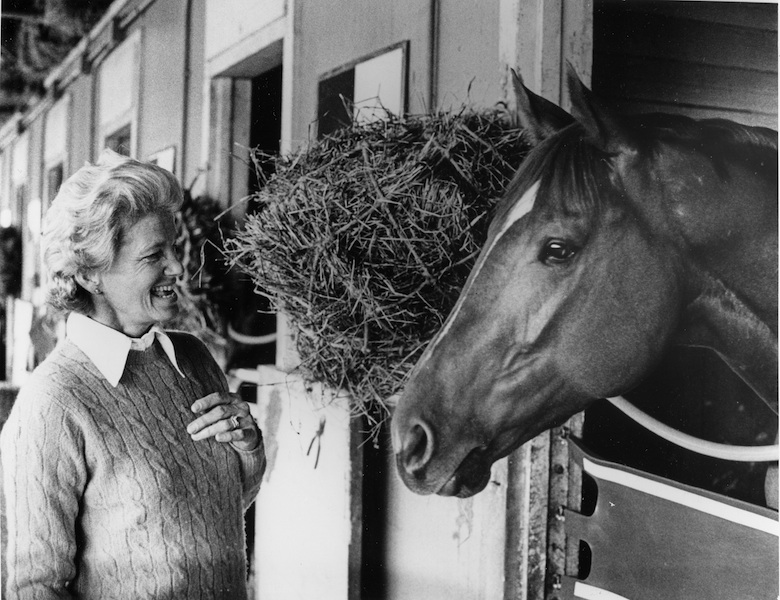
One week, to the day.
The following Sunday during Coffee Hour, a woman came up to me and asked casually,
“Did you know that Secretariat gave a million dollars to our church?”
“You mean, the Secretariat of the U.N.?”
“NO. THE HORSE.”
Of course I thought she was nuts, or at least, crazily mistaken. I went home, found an email address for Secretariat.com, and sent a brief note. This could not possibly be true, right?
So, while I was at it, I asked if, indeed, Penny Chenery—a Smith College Alumna—had named Secretariat to honor Elizabeth Ham, a Mount Holyoke College Alumna. (Miss Ham, as you know, was Secretary to Penny’s Father, Christopher.)
So, here’s the thing: Smith and Mount Holyoke (my Alma Mater)—are rivals. There are seven colleges known as The Seven Sisters—Smith and Mount Holyoke are but two of them. And there’s no huge reason for them to be rivals, except perhaps that they’re a mere seven miles from each other.
Oh, yes, and each has a distinction that probably annoys the other: Smith is the largest college for women in the world. Mount Holyoke is the oldest. Our two colleges have no rivalries with the other five schools--there’s just something about Smith and Mount Holyoke that causes friendly growling, even when we socialize. We don’t mean it. But we do.
I’ve even referred to Smith as, “The ‘S’ Word.”
So, for Penny to take the suggestion that Miss Ham--a Mount Holyoke Alumna--threw out (to honor her own previous employer, the Secretariat of the League of Nations)—obviously, that was a serious honor. May even have given Penny heartburn for a minute.
But they’d tried to register several other names with the Jockey Club, unsuccessfully: Sceptre, Royal Line, Something Special, Games of Chance, Deo Volente (“God Willing”). All were rejected. Finally, Secretariat—and the Jockey Club gave the nod.
I sent off my email, my heart filled with wild-eyed curiosity. But the next day was Monday, and I had to go to work and forget about it for at least eight hours. Much to my shock, I walked in the door at 5PM on Monday, June 30th—and my life changed forever, and for the better.
As I walked through the door, I heard a voice on my answering machine:
“This is Penny Chenery, calling from Lexington, Kentucky…”
I screamed, and grabbed the phone before she could finish her message and hang up.
It took one nanosecond, for me to compose myself enough to say, “Hello? Being the gracious intuitive that she was, she kicked off the conversation immediately, and put me at ease with a challenge:
“SO. YOU went to Mount Holyoke. I went to Smith. Huh.”
Retort:
“Oh…couldn’t get into Mount Holyoke?”
(Yes, even as the words came flying out of my mouth of their own volition, I was screaming at myself, inside my head: “Marion, you’re an idiot.”)
She actually laughed aloud, a hearty laugh (Phew!)—and responded,
“Great! You’re a smartass!”
WHAT? The Queen of Horse Racing—the elegant, Pelhamite Princess, The Stereotype of W.A.S.P.-iness—just called me a “smartass”?
She confirmed with a bit of dramatic flair and chagrin that, ugh, yes—yes, his name did honor Miss Ham, her job and her suggestion.
The conversation flowed from there. For 45 minutes, she regaled me with parts of her story: Yes, her Father had been a member of Christ (Episcopal) Church, Pelham, for 50 years.
She got married there. Baptized her babies there. And, in ’73 when she divorced John Tweedy—Father Hoag was her counselor. She loved and missed Christ Church, Pelham, it was the church of her heart.
One brief tale was about her Father, standing up during Mass one Sunday—and his foot went through the floor. After church he walked up to the priest, and handed him a blank check:
“Please buy a new floor.”
Riva Ridge…Christopher knew:
Suddenly somber, her voice shifted as she began the story of Riva Ridge, saving The Meadow, and of her Father, understanding this—in spite of his Alzheimer’s. Mr. Chenery was in the hospital in New Rochelle, where he’d been for several years. By May 6, 1972 (Riva’s Kentucky Derby day)—the once-brilliant man was fully in the throes of the murderous disease.
Two of his nurses turned on the Kentucky Derby, so he could watch his beautiful homebred race.
They doubted that he’d understand what was going on, but still they talked to him about Riva, Penny, The Meadow and the Kentucky Derby.
As it became obvious that Riva was going to win the Kentucky Derby—as his gorgeous boy screamed for home—a tear ran down Christopher Chenery’s face. Alzheimer’s had tried to rob him of all memories, of all understanding—but, as Penny said to me—deep in his soul, he understood that his beloved Meadow had been saved. His Riva Ridge literally saved the farm.
I cried on the phone as this story unfolded. Penny grew silent, but only for a minute. Then she went back to effusing, that she was so happy to be connected again to Christ Church.
The million-dollar prayer.
And why, yes, Secretariat gave a million bucks to the church:
Everyone who knows horse racing knows that “big horses”—super Champions—toss out a lot of hormones every time they race. And that, sometimes this means that, at the end of a horse’s racing career—she or he has viability problems in the breeding shed.
This was another of the moments that told me about Penny’s personality, her no-holds-barred and honest attitude. Using the lingua franca of a farmer, she stated simply, “We were afraid he was going to shoot blanks, so I called Father Hoag and asked him to pray.”
Father Hoag prayed.
You know the rest of the story: obviously, Secretariat proved to be fertile, and went on to throw some of the greatest broodmares in the history of racing. The syndicate sent a check for a cool million to Christ Church.
I was floored.
At the end of those 45 minutes of regaling me with tales of tails, the icon posed a simple question:
“So, what’s your dream, Dear?”
There was something about Penny that made people want to be honest. Or perhaps, it was a magickal spell that she wove, that forced people to say what they really thought at the moment. Whichever the reason, I stated calmly,
“I need to become the Oprah of Horse Racing.” (Even as I said these words, I thought, “What the hell is wrong with you, Marion????”)
Her voice sounded skeptical: “Why?” she asked—and rightly so.
“Because I need to help make the sport more nurturing and loving for horses…and egalitarian for women. I need the influence that comes with being known, to be heard.”
I could hear her smile over the phone—we were on the same page. She nodded. (I could see her nod, in my mind’s eye.) She, too, was very worried about horses’ welfare, and about the need for strong, smart women in horse racing to come to the front.
She stated frankly that she and several other female scions in the sport were “getting old, and will die soon”—and that the next generation of females—like [me]—had to rise up, to take over the reins.
By this time, I was so jazzed that I couldn't shut up.
I said that I needed to earn enough clout that, if I was at a track and saw a horse being abused —I could call the President of the track, and hear his assistant say,
“Oh, s**t. It’s HER.”
At this, she laughed loudly, and chimed in,
“That’s what they say when I call, too!!”
She bounced into asking how I’d do it: I responded that I’m a writer and editor. I would write, I would grow my reputation as a writer in the sport. Eventually, I would start a media company that covered all the bases: print magazines, radio, web…
She cut in, and made a pronouncement, followed by an invitation:
"Let me guess: you’re smart; you have a lot of friends because you’re funny as Hell—and you talk too much. You remind me of my best friend.” Then,
"Can you meet me in my box at Saratoga on opening day in three weeks, and we can see what we can do to get it started?”
I felt around in my chest, mentally, trying to find my heart—because it had stopped beating.
Penny Chenery had just uttered words that would change my life: she didn’t know at that exact moment, how it would play out—but she would mentor me. She would open a door where before, I could see only walls.
It’s a good thing Skype didn’t exist back then, because I was in utter shock. I nearly dropped the phone, but somehow managed to spit out an acceptance of her invitation, that I’d meet her there, yes, Ma’am. She told me the time and Clubhouse box number, and we agreed to meet on July 23 in Saratoga, front row.
Date with Destiny
Twenty-four days later, I was attired appropriately—albeit, feeling a bit like Scarlett O’Hara, wearing the green drapes—arriving at the Clubhouse at the appointed moment. As I ascended the stairs from the apron, I was in The Penny Zone. Upon my arrival, we shook hands, she smacked the TV in the box, scowled and asked me,
“Can you fix this thing? It hasn't worked all day…”
I tried everything. I unplugged-and-plugged. I smacked it around. I inspected the wires—as if I knew what to do. Surrendering to defeat, I turned to her and asked, “Did you pay your electric bill?”
She chuckled, and thus began our afternoon, and our unique association.
I spent about two hours in her box with her. She asked, how I handicap races—and whom I would pick for two particular races on the card. I was pretty sure that I was being tested: fortunately, I picked the exactas for both those races. She was duly impressed.
I urged her to open the Meadow Stable-blue-and-white metallic gift bag that I’d brought. (The dollar store really IS a life-saver…) In the bag was a wrapped box, and in that box—a coffee mug with an etching of Christ Church on the side.
As she held the mug aloft, a few tears trickled out of her eyes. She reiterated, how much she loved that church, and what a special gift it was. I responded, “It’s the Episcopal way: you give us a million bucks, we give you a five-dollar coffee mug—and call it, Even.”
She laughed and repeated her original assessment, that I’m a smartass.
Penny, the sharp cookie, could see that I was nervous. (This was unusual: I’d been in the music biz in Atlanta in the mid-80s. I worked for the Grammy Awards—I met virtually everyone who was anyone. No one made me nervous. But they were just rock stars.)
This was Penny Chenery—practically a sacred institution, and the owner of another sacred institution. She was Penny Chenery—and I was not. Of course I was nervous.
She patted my hand and said, “I want to make you laugh, may I tell you a story?”
She took great joy in this: slowly and deliberately, she watched my face as she pulled out each word with care, and perfection. Her splendid blue eyes twinkled as she recounted thus:
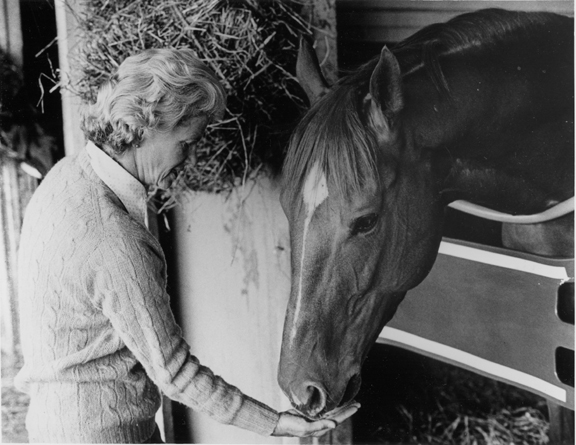
(photo courtesy of Secretariat.com)
Shortly after Secretariat won the Triple Crown, she was the focus of a press conference at Keeneland. Seated at the table with Keeneland honchos, Penny looked out at a sea of journalists.
All of them, males. Not a single female face, could she see in the crowd. For another woman—one who lacked The Right Stuff—this might have been the setting for a nervous breakdown.
If anything, I think it charged her battery. Challenged her to sit straight, head aloft. Focus those blue eyes on a point at the back of the room, and look over the crowd—giving absolutely no clue to them, as to her thoughts. She owned that room.
She patted my hand again: “Well, an idiot raised his hand—and asked me how it felt to be the ‘only woman in horse racing.’ Apparently he’d forgotten about, oh, Allaire du Pont and Elizabeth Arden…?”
Slowly and deliberately, she continued: “I replied, “Excuse me? and he actually said, ‘Mrs. Tweedy—do men scare you?”
She took her time as she lowered her head a bit—rolled her eyes up at me, and dropped the register of her voice:
“He asked if men…scare me. So I said,
‘Screw the men. I’ve got the horse.’”
I exploded in laughter. Gales of it. Tornadoes of it. Like a machine gun at a shooting range, I lost it, doubled over, howling. Tears of joy rolled down my face as I gasped for air, even as the insanity of this moment hit me between the eyes.
I kept laughing, but managed to gesture, wildly, “OH! I want a t-shirt, a bumper sticker, that reads, “’Screw the men. I’ve got the horse.’ – Penny Chenery”!!!!!
The power of what she said—that she—who looked for all the world like the most proper Clubhouse-sitting, horse-owning woman in all of W.A.S.P.dom—had just said, “Screw the men. I’ve got the horse.”—BLEW. MY. MIND.
Apparently this was the desired response, for she sat back, satisfied, smiling, and laughing with me.
And then…she winked. She winked, and in that expression, I knew everything I needed to know: that, had we been at Mount Holyoke—or Smith—together as students, we’d have found each other and become fast friends. Hung out together. Spent a lot of time in Student Council hearings.
She winked, and in the closing of that one bright, blue eye—I saw the imp who loved being a smartass, and appreciated others who are, too. I saw the cool control of a woman who would have made a brilliant comedienne, had she chosen that line of work—for her delivery was perfect.
She had the rare ability to assess a situation almost instantaneously—and drop a zinger before the audience (or, in the case of the Keeneland Idiot, the victim)—realized what had happened.
I love that about her. To sit demurely at a desk, hands folded. Listen to a silly person, posing a sexist question—then, zap him with the same grace and aplomb with which she served tea? That is a gift, a rare ability. As every good comedian knows—timing is everything. Penny had nothing, if not perfect comic timing.
And that is a side of her that not everyone got to see, I’m afraid. Maybe I’m wrong—perhaps her wicked humor and lack of aversion to saltiness were well-known among racing insiders.
All I know is: that day, in Saratoga, Penny became my Mentor, who opened vocational doors for me even as she taught me that, being my actual self was the only authentic way to conduct A Life Well-Lived.
This is The Real Stuff of Life. Only with a metaphoric wink and a zinger—by being authentic—can anyone thrive in this world. We may find career success, but if we lose ourselves in the process—what have we gained? Penny seemingly had it all, and she compromised nothing of herself in the transaction.
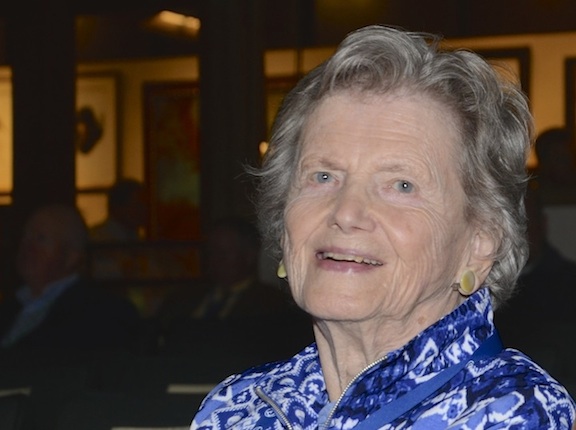
Penny Chenery indeed, was all the fine and beautiful things that people want her to be. Perhaps, even that tellers of racing history need her to be.
But she was so much more than simply, “fine” and “beautiful.” She was a real, flesh-and-blood human being. She was a woman of faith, and she knew that God had made her to be the person and personality she was. (He never asked her to change, because that would be to say that He’d made a mistake.
Penny needed no “fixing.”) So if God, her Creator and Confidant, had no compulsion to make her toe some Invisible Line —then who in horse racing, who on Earth—had the right to suggest she change?
Penny was a woman of tiny body and big spirit. Irreverent and reverent. Wickedly funny; intellectually superior; socially savvy; real, intense, honest—and always, always—herself. She didn’t pretend to be anything she wasn’t.
If she disappointed someone because she lived her life as she did—in an era when women still were expected to live as others told them to—well, that was their problem through which to work.
She created opportunities for me on that day in her Clubhouse box, and opened doors that led to other doors, and to today. To write simply that I am blessed and honored—would be an understatement of monumental proportions. Never can I thank Penny enough, or thank God enough for putting her into my Life.
I’m not so arrogant as to think that I’m the only person mentored by Penny over the years. But I know that I was singularly blessed, to be in her beloved church, at the right time. I was singled out to meet her through Secretariat, and his great gift to that church.
And the perfect timing, that just one week before—I’d realized with a startle, my true vocation as a communicator in horse racing.
Our church connection may have endeared me to her at first--but then our shared humor, love for horses and concern for women’s roles built on that solid foundation of shared faith. So, of all those whom Penny Chenery no doubt mentored over the years—the way in which we were brought together, and her embrace of me initially because of that connection—is unique, and an honor.
Penny indeed is an example—of what a woman can achieve in Life, in general. And especially, of what we can do in the sport of horse racing, and business.
I have no doubt that, even as she marched toward Death, Penny did it with pragmatic dignity and focus. She did not whimper into Eternity: she knew the moment was coming, and she embraced it. She gathered her family ‘round her for those final moments. She didn't “fall” into Death, she strode in—mind and heart wide-open.
And, Klingon warrior that she was/is, I’m convinced that she pronounced—at least to herself-- “It is a good day to die,” knowing that Heaven was just on the other side of her eyes’ flutter shut. And that her beloved Riva Ridge, Secretariat and parents waited there to welcome her to their eternal Home.
The mighty Warrior Woman could relax at last, for she’d achieved on Earth all that she was created to do.
* N.B.: re this story line, a film and fiction vs. non-: This article is covered by the Copyright of Equine Info Exchange, and therefore is owned by the writer and the website. Any use of this story by anyone other than these two parties (writer and Equine Info Exchange) will constitute a violation of international Copyright Law.
Post Script: The film, “Secretariat,” begins with Diane Lane as Penny, reciting from the Book of Job in the Bible. It was fitting, for Penny knew and understood not only the might and strength of the horse—but also the fact that God, Himself, was in every molecule, every DNA strand—in the details, themselves.
Job 39:19-25New Revised Standard Version (NRSV)
19 “Do you give the horse its might?
Do you clothe its neck with thunder?
20 Do you make it leap like the locust?
Its majestic snorting is terrible.
21 It paws[a] violently, exults mightily;
it goes out to meet the weapons.
22 It laughs at fear, and is not dismayed;
it does not turn back from the sword.
23 Upon it rattle the quiver,
the flashing spear, and the javelin.
24 With fierceness and rage it swallows the ground;
it cannot stand still at the sound of the trumpet.
25 When the trumpet sounds, it says ‘Aha!’
From a distance it smells the battle,
the thunder of the captains, and the shouting.”
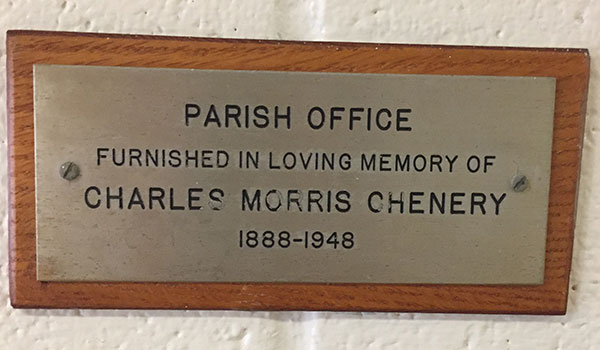
in Pelham, New York
Post-Post Script: Note, that there’s a plaque next to the office door at The Episcopal Parish of Christ the Redeemer in Pelham, New York, dedicating the parish office to Charles Morris Chenery, Christopher’s brother. This plaque is the quiet tip of the proverbial gift-iceberg.
There are more interesting stories in our section on Racing & Wagering.
Are you interested in promoting your business or sharing content on EIE? Contact us at info@equineinfoexchange.com








